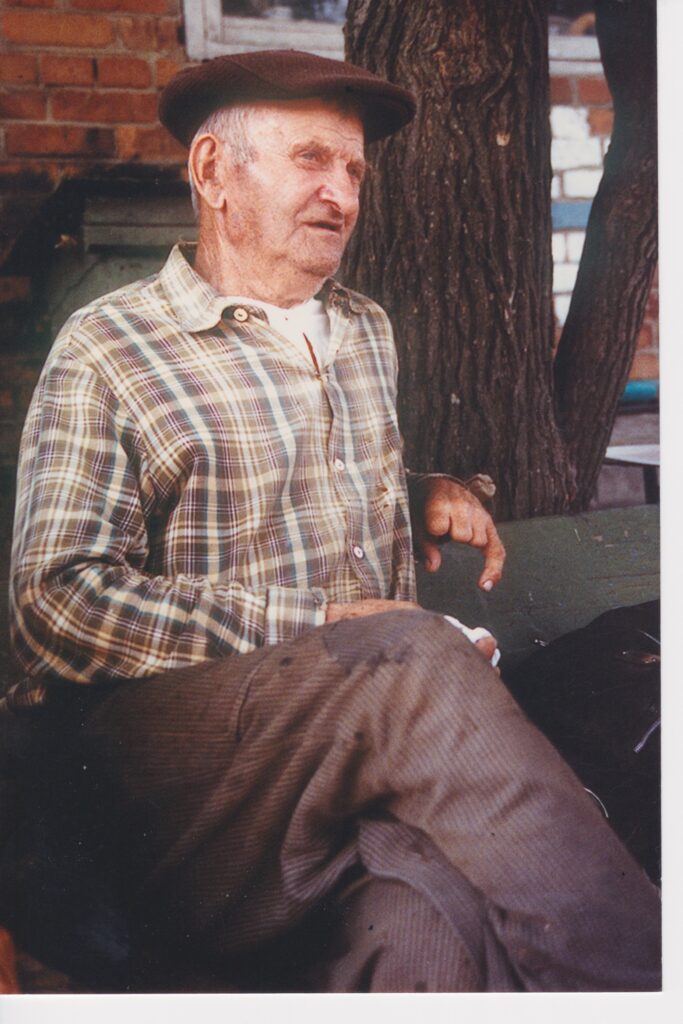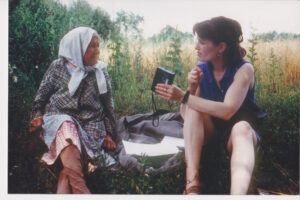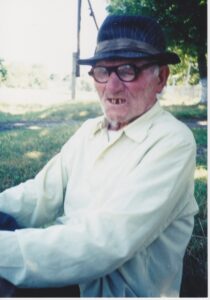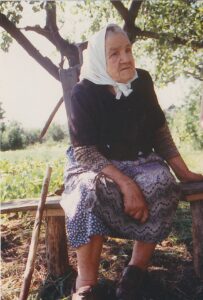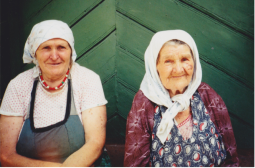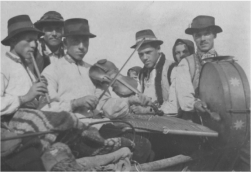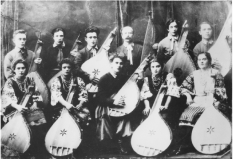Oklei Andrii Platonovych, b.1911 and his wife Oklei Marfa Illivna, b.1917
—Were you born here?
Andrii Platonovych: In this village, on this very site.
—What church did you go to?
Andrii Platonovych: To my church, not the evangelical one. To the Orthodox one.
—When did the evangelical church appear in your village?
Marfa Illivna: Recently…
—Auntie, when were you born?
Marfa Illivna: 1917. My name is Marfa Illichna.
—What was your maiden name?
Marfa Illivna: Buba [below her husband says her maiden name was Huba].
—Are you from here, too, not from Nyzhniy Bishkin’?
Marfa Illivna: No, I’m from Vyshniy Bishkin’.
—So, when did the evangelical church appear in your village?
Andrii Platonovych: Well, I was a boy. I was 13 years old. Let me think what year it was. They came in 1951, no, earlier, because in 1951… Well, I can’t say for sure what year it was.
—What kind of family did your parents have?
Andrii Platonovych: I cannot speak about this anymore. I will begin to cry. My nervous system… and I am deprived. When I was two, my father died. My mother was left with five children. I was illiterate. I didn’t have a life—I was surviving and suffering. And now it’s been 15 years that my nerves… I’m good for nothing.
—How much land did your mother have prior to the kolhosp?
Andrii Platonovych: The land at the time was given to men only. If a father had daughters, they would not get any land. People went to work as day laborers, and over there we had the landlords in Oleksiivka, Krasnopalovka, and Biliaivka. The Germans that were settled here by Catherine the First lived there. Or some other people. I was a boy at the time.
—Were the landlords Germans or Russians, too?
Andrii Platonovych: Russians and Ukrainians, too. A German was a landowner of that forest over there, about 60 hectares. During the Revolution in 1917, they were fleeing. I was a young boy and went fishing there. They were coming here in boats because they had their carts here. Back in the day, there were no cars; they used horses to go abroad. I asked them, “Why are you running away?” They said, “You’re little, but you understand that we’re running away. If we don’t, they’ll beat us up.” Some didn’t flee and stayed in Raznofalkovka, Biliaivka, Horokhivka, well, many villages with the landowners. Simple folk like the father of my friend used to work as day laborers; they did whatever they were told and earned 20 kopiiky per day. They would come home and have to pay tax; those who didn’t pay the tax would get ice thrown into their shirts to make them pay, but they didn’t have any money to pay with.
—Was this the town hall?
Andrii Platonovych: Well, yes. We had a town hall and one head of the village council; now there are 40 of them, but back in the day he was one for the whole village. I was wounded in Chita, and we were traveling via Kyiv and stopping at the station there. The wound was here and here; my fingers didn’t move and the leg… I was in the tank division and we were besieged around Warsaw and we were retreating. We had 300 tanks, 300 trucks, machine gunners, horses, snipers, and miners.
—Do you remember the civil war?
Andrii Platonovych: Yes. There was a revolution.
—Did any of your relatives take part in the Revolution?
Andrii Platonovych: My brother did.
—Where was he?
Andrii Platonovych: This is how it was at the time: when Lenin started the revolution, some took part in the military action on the German side, and some—on the Soviet side. My brother was with the Soviets, and some others were with the Germans. Some of them would come to the village where we just built a house; we lived up the hill, my mother and I. One time, seven people came to our village with spikes (weapons at the time); they were not the infantry—they rode horses. And they had a battle, hitting each other into the abdomen with those spikes [presumably lances].
—Were these Germans and the Red Army soldiers?
Andrii Platonovych: No, the Germans. Our soldiers fled. Here is [the village of] Nyzhniy [Bishkin’] and there’s also Cherkas’kiy [Bishkin’]; the Germans were moving from Nyzhniy [Bishkin’], and our soldiers were after them; then our troops came into Nyzhniy [Bishkin’] if the Germans were still there; then they retreated to Verkhniy [Bishkin’].
—When did your brother return home?
Andrii Platonovych: He came back home after the Revolution when the war began in 1917; he was drafted to war. Not just him—his buddies, too. He went to war in the Carpathians. He saw the mountains there.
—When did he come back from that war?
Andrii Platonovych: I don’t know, I was little at the time.
—Was it in the 1920s?
Andrii Platonovych: No, earlier. He got married in 1920. No, he got married earlier in 1919 or 1918; he had a son, my nephew, who grew up and later went into the army.
—When your brother came back home, was he respected for having taken part in the Revolution? Did he have any authority?
Andrii Platonovych: Yes, he did since he wasn’t a prisoner of war in the German army; he saved himself and was hiding; some other people got captured. There were some in the village here. I was little, and I remember one landowner who lived where we now have the store. This was all his land, and it was fenced with oak planks. Mavra Holovlians’ka’s husband was captured by the river and brought to be executed by firing squad. When the war began, he was drafted. He didn’t serve anywhere, and then he came back. [My brother] came back after serving in Kyiv and Kharkiv. My sister brought him food [in detention]. Well, when they arrested him, we—the boys—ran there to see. They said, “He will be executed.” I forget the man’s name. There was a post with a drain, and they wouldn’t let him go there. Then the colonel said, “Let him go to say goodbye.” She went to say goodbye (we were watching), and she brought the child with her. The colonel said, “Don’t execute him. Let him go with us.” And he said, “I will go with you since you asked me.” And they went somewhere—who knows where they were—but he was away for three years, or maybe less.
—When your brother came back, did he have to join the party?
Andrii Platonovych: No, there was no party at the time.
—When the kolhospy were set up, did your mother have to join?
Andrii Platonovych: No, she didn’t. There was no kolhosp at the time. Then he got married, and in 1920 his son was born.
—Were there any komsomol’tsi in your village after the Revolution?
Andrii Platonovych: No. They started in 1935, 1936, and 1937.
—When the kolhosp was set up, were there no komsomol’tsi at the time?
Andrii Platonovych: There were komsomol’tsi and they were bandits. They were throwing children out of their homes through the window. They would open the windows at night, grab the children, and throw them into the snow outside. This is how they dispossessed the kurkuli.
—Are you talking about one of your neighbors?
Andrii Platonovych: Yes, my godfather nearby; he lived in the woods. He had a mill, oxen, and two cows. Yesterday, a policeman came to our house and his daughter too (he had already died, and so did his wife) asking to describe how he was dispossessed. I was about 17 and I saw this. A family named Kocherha lived near our house. When the Revolution began, they wanted to set up a commune here; they wanted to have communes everywhere. They started building a house with 14 rooms nearby for everyone to live; they set it up in the mountains, near mount Homol’sha. Then everything turned around; Stalin didn’t let the commune happen.
—When was your godfather subjected to dispossession?
Marfa Illivna: After he was evicted from his house and the house was demolished.
Andrii Platonovych: Yes, he lived nearby. They came and evicted him.
—Did they come in carts?
Andrii Platonovych: They came on foot and evicted him in a way you would come in when we were outside; you’d enter the house and tell us we had no right to come back in. He was evicted in March or in winter. He had four children; they went to different places, and he was left with his wife. When they came, they said it was not his house anymore and he could go where he wanted.
—Who came to his house?
Andrii Platonovych: The locals. Kocherha brothers came and some other people; they are dead now. I lived with my mother and we were considered poor; they came to our house as well and took a loaf of bread from the table; we were left with nothing.
—Where did your godfather’s family go after their house was taken away?
Andrii Platonovych: After he was evicted, all of his property stayed there. Each of us—you or me— takes care of the food to eat, right? Back in the day people had cows, and two or three pigs—to have meat. They took everything, and my godfather took an icon and said, “Let me live some more.” He left, and they remained the owners of this home and property: two cows, two oxen, a horse, pigs, lard and meat, various kinds of flour, and a windmill. He left, but his father-in-law spent one winter in his house. At the time, the activists, if they found a piece of bread in the house, would keep searching in the yard; they had metal spears and used to stick them into the soil to see if the house owner had hidden any bags with grain in the ground. In this way, they’d find wheat or barley and confiscate it. They’d say to the owner, “You dug it all in to avoid giving it to the state?” My father moved to Zmiiov for the summer. He did various jobs for the people. He had two boys after he was evicted from his house; they ran away somewhere. One went to the Donbas. He used to make hay or grind the grain for people in a hand mill. They would pay him or give him some flour. There was a plant in Zmiiov (I can’t remember its name), so he went to work there. With the money earned, he bought a horse and started working in a plant there. They would carry wood planks and cement from the station to the plant. Later on, he built a house. His daughter is living in that house by the station now. He died about three years ago.
—What was your entertainment like when you were a young man?
Andrii Platonovych: I was the one that stayed with my mother. My brother left, and the sisters got married; so, it was just my mother and I. The kolhosp was set up, and they didn’t know when to plow or when to sow. You had to sow, reap, and transport the crop on your own. What could a poor woman do alone? She used to spin yarn and weave for people, and people would plow, sow, and reap everything. I was about ten; I couldn’t be very helpful. My sister got married to a neighbor, so I lived with them and grazed the oxen and the cows. They would go to plow, and I would drive the oxen and the horses, and they would sheave. The land was leased to us for 10 years. There were how many of us—four, five—and each person was given two fathoms of the good land and one fathom of bad land. My mother and I couldn’t have gotten enough land, being just two of us. But we survived; we didn’t buy anything; we ate whatever we grew on our land. I was little and I was made to thresh the grain which I didn’t know how to do; I just did whatever I could.
—How old were you when you started going to vechornytsi?
Andrii Platonovych: I was around 25 years old; I just got married. There were no vechornytsi at the time; we had collectivization and people were persecuted to make sure they stopped going to vechornytsi, to prevent groups from forming.
—Who persecuted people?
Andrii Platonovych: The head of the village council and his administration, the activists.
—Did they come to you to tell you that you were not allowed to go to the vechornytsi?
Andrii Platonovych: No, it was just not allowed. There was a house of a dispossessed man over that fence; they came and caught us in that house, pulled the buttons from our pants, and chased us out with our pants unbuttoned. You couldn’t run far with your pants unbuttoned. Some did anyway.
—What did they do to the girls?
Andrii Platonovych: We don’t know what they did to the girls; it was long ago. Then the famine began, so I was not getting married; I was going to Kolachi and Komaryshche on my own to exchange [clothes] for grain and flour. You’d take shirts and cloth to Kuban’ because they didn’t have any there. We used to wear linen shirts, and they had rough shirts called riadno. They made pants and shirts out of this rough fabric. They had a good deal of quality grain; people used to grind the grain on a roller.
—Did they have kolhospy?
Andrii Platonovych: Not yet.
—Were you already in the kolhosp when you went exchanging goods from produce?
Andrii Platonovych: I hadn’t joined yet at the time. I joined in 1935.
—Prior to that, you didn’t apply to join and you were not forced to?
Andrii Platonovych: No, they didn’t argue with me; I was young at the time. When I got older, one fool was ordered to set my house on fire because they claimed that I brought four bags of flour. It was at the time when I went to Zamky—you know Zamky station nearby? — and at night when I was about to go home, the people from Laman’ took away my [object of the verb is unclear in the original]. I spent the night in Zamky and came to the market in Laman’ in the morning to be told by the person who set my house on fire, “Go take a look; your house is on fire.” My hands fell. “Who set it on fire?” He said, “I don’t know.” He did it because they claimed that I brought four bags of flour. How could I have four bags? I would normally get 8 kg of millet and 8 kg of flour and give it to my mom so she would sell it on the market for money. I used to go to Kharkiv and buy children’s shirts for my acquaintances; they would give me millet and flour; they were kind to me and fed me for free. I would bring the millet and the flour to my mother and leave again. My cousin also lived with us because she was an orphan. When the house was on fire and the reeds snapped, my mother was lying down facing the wall. At first they thought the sound was from the rain outside, and only then they saw that it was the fire. (I planned, but didn’t have time to put up the bars on the window. If I had, my mother would have burned alive there). My sister broke the window and they jumped out. My mother took the bundles with food with her, and outside there was the man who set the house on fire. She said to him, “What are you standing here for, son of a bitch? Do you think I’ll give you my produce?” Prior to this, my mother was here when he came and took her wooden barrel [zhlukto] with 10 rolls of linen, each roll about 20 meters long. My mother used that wooden barrel to bleach the linen.
—Was [the man who set your house on fire] a member of the party?
Andrii Platonovych: A minor bastard. When my mother and sister left the house, they couldn’t do much. Later, the main bandit from the regional administrative center came from Balaklei region where we belonged at the time. The communists were in power at the time. The head of the village council came, too, to look at the house that burned down to the ground. The property of my brother and two sisters—overcoats and clothes—was stored in the attic at my mother’s house. They were evicted from their houses and they said, “Mother, you won’t be evicted; we’ll keep our things in your house.” Everything burned down there. I came home wearing my last pair of… I had nothing to change into and nothing to eat. I brought 8 kg of flour and 8 kg of wheat; the two of us were in the house; my mother was cooking. Here come the administrators Shapovalov and Mandenko, “Why are you home?” “Where else would I be? I just got home. Don’t you see I’m still wearing my long underwear?” After they left, I took a fishing rod and was on my way to try to catch some fish. They met me on the way, “Where are you heading?” “I’ll go fishing.” “Go stack the hay.” Where we now have the bridges, was a field of hay, already mown. “How will I go to stack the hay if I have such misery at home?” “We don’t care about your misery. Go stack the hay.”
—So, they told you to go to work?
Andrii Platonovych: Yes, they would force us to go to work at the time. It was a time of famine, and people would flee to save their lives because they didn’t give us anything to eat here. I tried to run away, but he caught me in the yard and kicked me in the back. He arrested me and took me to a cellar. They also caught Musiivna and Kholodniak, so the two of us spent the night in the cellar. In the morning, my mother came and brought me some food to eat; then they sent us to stack the hay. We spent the day stacking the hay; I must say they gave us broth to eat there.
—How long did you work stacking the hay?
Andrii Platonovych: About two days, and then we ran away. There was a river; you could swim through its shallow part and escape. When I was young, I went to parties; I didn’t have a house at the time. There was someone else’s broken house nearby, and I fixed it. I made the widows, the doors—everything. So, what? At the time, all my friends were married, and all the girls were taken. So, I said to my mother, “I want to get married, mother.” — “It’s up to you.” I started looking around, and many girls were chasing after me. One would say, “I’ll marry you.” And I said, “I don’t want you.” I didn’t like her. Then this lady… At first, I didn’t know where she lived. She lived in Kharkiv and worked as a nanny. I knew her father; he was old and worked as a brigade guard. I worked there by the tractors, and so we got acquainted. They liked me because I was agreeable; they would tell me to do this and that, and I would do it. I didn’t know her at all. I had a friend there; I didn’t want to work there anymore, so came to work in the kolhosp here. That friend of mine courted her, but she didn’t like him. He started talking about her—how good she was and such.
—What did he say to you? Did he say that she was good but didn’t want to marry him?
Andrii Platonovych: Well, yes. He didn’t look so good; he was all freckled. I was 25 and she was 20. One time, she came home, and I started wondering what I could do to see her. She and I had a friend in common, so I said, “Natalko, how could I meet such and such and talk it over with her?” One day, I was transporting clay, and she was walking by—ample-bodied, a braid all the way down to her ass—such a beauty. Some guys had been working in the field, harvesting crops with a sickle; one of them said he’d take a nap and let the others drive the tractor, but the other guy ran over him and killed him. It was his funeral she was coming back from when I saw her. She was on her way to her sister’s. I thought, “Well, that’s her. How could I meet her?” Then in the fall, I was on my way to the store, and she was walking by. Then she went to the club, and I followed her there. I wanted to ask that friend of mine, you know, “Give her a shout and I’ll talk it over with her.” But we were all chased out of the club because they were going to close it. She went her way, and I went back. Well, I thought, it’ll work out somehow. I had an uncle who wasn’t a good negotiator, and I said to him, “Uncle, you know what? I know her old man and I spoke with him; he liked me. Go to Huba [above, wife said her name was Buba] and ask if they will let me marry their daughter.” He agreed. Vodka was hard to buy at the time; you could get it only in Kharkiv. I went to Lyman and bought seven liters there for the matchmaking. My uncle came and started talking to them. Their neighbor said, “He’s an active guy, a worker. He’s good. Let her marry him, grandpa.” So, they decided to let her marry me.
—Did they ask her?
Andrii Platonovych: No, they didn’t. She didn’t know I existed. She was thinking of some other guy. When my uncle went to see her folks, they said, “Whatever she says. We don’t decide for her.” My uncle came back, “Go find some vodka.” I said, “I got vodka.” — “Well, then we’re going tomorrow.” So, we went to their house. Snow was everywhere. I came and she was not there. I said, “Where is she?” — “Over there, in the barn. She’s making flour.” (There was a small wooden handmill). I went there, and she was making flour. I said hello, and she stood there dumbfounded. I said, “Let’s go to the house.” So, we went, and her family said, “Well, will you marry him or not?” She shilly-shallied a bit. I asked, “Will you?” She turned red and said, “I will.” And we’re still together, thank God. She’s weak now, and I have post-concussive syndrome.
—Did you have a wedding?
Andrii Platonovych: Yes, four days.
—What year was this?
Andrii Platonovych: 1937.
—Was there any music?
Andrii Platonovych: A harmonia.
—What kind of music was there in the 1920s?
Andrii Platonovych: A fiddle, a bas, and a balalaika.
—Would all of these instruments play together at a wedding?
Marfa Illivna: Yes, at the wedding.
—How many strings did the bas have?
Andrii Platonovych: Five. I know this for sure because we had a bas at home. My father bought it or something. I was as little as our granddaughter is now and played with it all the time.
—Why did your father buy it? Did he think that his sons would play it?
Andrii Platonovych: Nah. Well, I don’t know. My father died when I was two. We just had the bas in the house.
—Was there a bubon in the 1930s at the weddings?
Marfa Illivna: In our village, it was just the harmonica.
Andrii Platonovych: Those were the poor years. After 1933, life was still hard; there was no vodka. We managed to get some denatured alcohol and partied for four days.
—What is denatured alcohol?
Andrii Platonovych: A kind of methynol that you mix with water [!!! I cannot answer how that was possible, unless the water dilution was large].
—Did you get married in a church?
Andrii Platonovych: No, we had a civil marriage. Just the two of us went to the village council and signed the papers, that was all.
—On what day would the weddings usually start?
Andrii Platonovych: On Saturday. The lent was about to start when we had our wedding on Sunday, so our wedding was quick.
—One could not have a wedding during Lent?
Andrii Platonovych: Not back in the day.
—Why did you marry him? What did you like about him?
Marfa Illivna: My father said he was a good guy. Back in the day, we listened to our parents. These days, parents don’t even know that their child had a baby.
—Did the blind startsi used to come to your village?
Andrii Platonovych: Yes, they played this spinning thing [obviously a hurdy-gurdy]. I was little at the time.
—Did they come up to people’s yards?
Marfa Illivna: They would be outside the windows.
Andrii Platonovych: I know they came into our house. We lived in the house that that man burned down, so they came into our house.
—Were there any women among them?
Marfa Illivna: Both women and men.
Andrii Platonovych: Both women and men, but there were fewer women.
—Did the women play, too?
Andrii Platonovych: No, the men played, and the women were their guides. She would take him by the hand and would lead the way. Or he would hold the cane and walk behind her.
—Did they sing?
Andrii Platonovych: Yes, but I don’t remember what they sang. It was long ago.
—Auntie, do you remember what they sang?
Marfa Illivna: No.
Andrii Platonovych: I remember they sang “Oh, give us something, don’t ignore our plea” [“Oi, daite, ne mynaite nashu pros’bu” – a begging recitative].
—Did you see any of them near the church for the khram?
Andrii Platonovych: I can’t say for sure.
—What about the market?
Andrii Platonovych: There were so many of them on the market. If you went to a fair for the Intercession of the Theotokos, you’d see so many of them.
—Did they play a bandura?
Andrii Platonovych: All kinds.
—And a kobza, too?
Andrii Platonovych: There was no kobza at the time.
—What was the bandura like?
Andrii Platonovych: Well, a box like this with 40 strings; he would play the strings and there was a handle over here. He would play and sing a song. Kobza was large, and this box was small.
—Have you ever seen a kobza?
Andrii Platonovych: There was no kobza.
—Do you remember how the church was demolished?
Andrii Platonovych: Why wouldn’t I remember? It was in 1947, I think.
—After the war?
Andrii Platonovych: Yes, the church was toppled. They dug the foundation, and it tilted to the side and fell down. There’s a village here called Shulytivka. They bought all the wood from the church and made a farm for pigs. It rained heavily and there was thunder; everything caught on fire—the church, everything.
—During the German occupation, did the church work?
Marfa Illivna: Well, the church was closed.
Andrii Platonovych: No, it was never closed down. There was one foolish communist woman in the village council, and there was—what’s it called?— a winding-sheet in the church; she got in there and eased herself on it and later she died.
—Do you remember if the girls did circle dances by the river?
Andrii Platonovych: They did the goat dance on holidays.
—Did they go to the river when the ice broke?
Andrii Platonovych: I don’t know. Back in the day, the river was near the present-day store. We had a wooden bridge that was 44 meters long. I was a shepherd and measured it with my feet. Back in the day we had large lakes everywhere; now we have none. Back then, the ice moved fast and took down the whole bridge. The ice broke the bridge in two.
—When did they do the goat dance?
Andrii Platonovych: For the Annunciation. And on the radio they would announce the day to do the goat dance.
—What does this mean?
Andrii Platonovych: It was a custom. They would start from Zamok (our area is called Berezivka) and go in line, lifting their hands for those in the back to pass; then they would do another round of this dance and sing.
—Was this all done by the girls?
Andrii Platonovych: Yes, all the girls.
—What about the guys?
Andrii Platonovych: Guys would follow them, but they didn’t join hands.
—Why is that castle called Cherkasy?
Andrii Platonovych: This is an old story. Bishkin’—Cherkas’kiy Bishkin’—is so called because the Cherkesy [Circassians] lived here. Over there in the hills, there were graves and they had dugouts. They kept their cattle in the dugouts and harvested the grain. They would be asleep during the day and would come out at night. There was no one here. There was a river called Teplianka when I was a little boy; it has since dried up but back then there was water. They used metal fences. They’d lock themselves in. There were small children at home, and they killed them. They would put them behind the ledge [unclear; perhaps behind a stove].
—Were they the Tatars?
Andrii Platonovych: I don’t know. They lived over there. Now, it’s all overgrown with weeds; there used to be various potsherds. All kinds of things.
—Who told you about this? Did you see those dugouts yourself?
Andrii Platonovych: These dugouts are still there. Please, go take a look. There’s one deep dugout and one shallow; that’s where they lived.
—Did you see those people?
Andrii Platonovych: No, I haven’t. I don’t know where they went. There’s a river there called Dovzhyk and a deep ravine. The water would flow there from Donets’. Our people used to go fishing there. Those people would run up to them and take the fish from them. They would fry it and pour water over it; they would eat it just like that [ still half-raw?] and have diarrhea, so they were afraid to go there.
—Did the guys go to Nyzhniy Bishkin’ for entertainment?
Andrii Platonovych: Back in the day? We went both here and there.
—People say that Russians live there.
Andrii Platonovych: The Russians, just like now, are building something. There was a river and people made shepherd’s slings. They were coming from somewhere, like Romani people [interviewee says Gypsies] do, and asked the head of the village council to stay the night. They were told, “Stay the night or live here, if you want.” Then they build their houses here and they’ve been living here for many years.
—Were there bohomazy in your village?
Andrii Platonovych: Yes.
—Who were they?
Andrii Platonovych: One of them was my friend Stepan Volosianka. He worked near Lyman’ and painted icons, too.
—Did he live in Lyman’?
Andrii Platonovych: Yes. His wife is still alive, and they have a daughter. He made many icons at the time when it was forbidden to make icons or have them at home. They forbade, but he kept making them in secret, and those who knew would come to buy them from him.
—What material did he paint on?
Andrii Platonovych: Wood. I used to make wooden plates myself. I would saw as many as I needed. Then I would put them on glass using a specific tool [odbol’nyk], measure them up, and put a gold leaf [shumykha] from the old icons around.
Marfa Illivna: It was an old icon, and he just worked on the edges. It was the Holy Virgin, and he made St. Nicholas.
—Who did Stepan make icons for?
Andrii Platonovych: He made icons just like that. Whoever wanted to buy would buy them later.
—Were you and Stepan the same age?
Andrii Platonovych: Yes, we went to war together.
—When did he make icons?
Andrii Platonovych: Before the war. He lost one arm during the war.
—Could he sell icons on the market?
Andrii Platonovych: It was forbidden at the time, but people would come to his house to buy icons. I don’t know if he continued making them after the war.
—Did he make some money from the icons?
Andrii Platonovych: I don’t know; I never asked how much he earned.
—Did he only sell the icons or did he sometimes exchange them for other goods?
Andrii Platonovych: I don’t know. He was also a fisherman.
—Did he gild the icons or just paint them?
Andrii Platonovych: No, he painted the silver ones; they are called shumykha [gold leaf; also called sukhozlitka.] I don’t know where he got them from; someone must have brought them from elsewhere.
—Did he paint on canvas, too?
Andrii Platonovych: No, only on wood.
—Which tree did he use?
Andrii Platonovych: Any tree; pine for instance. He used to come to our house, and my wife went to theirs. We were friends.
—Did he have a farm?
Andrii Platonovych: He had everything.
—What was his wife’s name?
Andrii Platonovych: Uliashka. She lives on Hlynychka Street.
—Who forbade him to paint and sell icons?
Andrii Platonovych: The communists. My wife used to go to church nearby; she had to pay five rubli to go.
—Five rubli as a ticket or as a fine?
Andrii Platonovych: If you were a believer, you had to pay to go pray.
—When did people commission icons: for the benediction or just like that?
Andrii Platonovych: He would make them just like that. I’m the unskillful one. If I could make icons, I would—instead of sitting around. Neither can I draw or paint.
—Did people say that the deacon’s son was a member of komsomol’?
Andrii Platonovych: Yes, the deacon’s son.
—Was he forced to join or did he want to join?
Andrii Platonovych: He joined on his own.
Marfa Illivna: He was a communist and joined.
Andrii Platonovych: He… Don’t talk about him. He offended me. When people were taking the bond certificates in 1947, I was lying in bed. He came and started distressing me, “Give me 100 rubli.” I said to him, “Take me instead. Where will I get 100 rubli?” He was ill, just like me [a year of famine].
—Was he a tax agent?
Marfa Illivna: Yes.
—During the famine, did he go around collecting grain?
Andrii Platonovych: No, he was little at that time [i.e., 1932-33].
—When was he born?
Andrii Platonovych: I don’t know.
—Did the deacon stay in the village a long time?
Andrii Platonovych: They wanted to execute him, but he got scared and died before the Revolution.
—After the church was closed down, did the deacon continue working there?
Andrii Platonovych: He lived in the village and baptized our son in secret. We went to his house and he baptized him there.
—In 1937 when you were getting married, had the church already been closed down?
Andrii Platonovych: Yes, but it was still standing. It was a good wooden church; my mother’s father-in-law built it. There’s a place called Vun’ where they had an oak forest. They felled those oaks and build a church. The nails were made from wires in a smithy; there were no other nails. They would cut the wire and make the nail heads.
—Who painted the icons in the church?
Andrii Platonovych: I don’t know about that.
—Were there other bohomazy?
Andrii Platonovych: There were some more in Lyman’, but I didn’t know them.
[singing a song about an unspecified icon]:
Virgin Mary was walking in the Elysian mountains,
She lay down to rest and had a dream:
Her son was taken away and crucified,
His hands nailed to the cross.
His blood flowed in three rivers, three streams.
God sent three angels from above with golden bowls
To collect his blood and not let it drain into the earth.
This blood had to be known to the whole world.
Let those who know this prayer read it on the road and in the field.
They won’t drown in the water, won’t burn in the fire, and won’t get cold on the road.
They will be saved by God and the Holy Spirit.
This was all.
[about this icon]:
If you go somewhere, nothing bad will happen to you, no misfortune, and God will always be on your side and save you if you fall. This was not the only icon; the house was smaller there; we had four icons—from corner to corner. There were about 15 icons, and these two were there. One was white and the other—just like that [all of this was not clear in the original interview].
—And then it [the icon] was burned?
Andrii Platonovych: Then it was burned and they threw the icon out of the window. The glass was broken, and then the icon was buried. And so, the people continued praying to it; we moved from there where we used to live and we now pray here.
—What did people do with the old icons?
Marfa Illivna: They burned them. We didn’t burn them, but others did. During the war, they got spoiled: the wood rotted. People would hide them in the cellars and barns or threw them away. We were evacuated and our icons rotted. Then [people] came and picked the ones that were in better shape and burned the rest.
—Was it considered a sin to throw away the icons?
Marfa Illivna: I don’t know. The good ones were kept, and the rotten ones were thrown away.
—Were they thrown away or burned down?
Marfa Illivna: They were burned; the activists burned them, not us. Those who went to the rich people’s houses burned the icons and did other things. That woman Mon’ka made a kutia one time and put a pot of it on top of the oven, and they—the neighbor—came and took it all and that’s it. They started crying, “Why did you take it? What am I going to do?” — “You’ll get over it. My children are hungry.”
